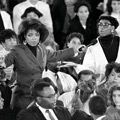Do You Have Executive Presence?
You're smart, driven, and good at what you do. But that alone won't be enough to score you a promotion or corner office. A slew of other factors that constitute "executive presence" — from your wardrobe to your ability to inspire colleagues — will also play a huge role in how far you'll go. We've broken it all down for you right here, from the big ideas to the finishing touches. So consider this the ultimate how-to guide for your brilliant career.

EXECUTIVE PRESENCE 101
Why are so few women running Fortune 500 companies? Because too many of us don't look and act the part. That's the startling conclusion of a groundbreaking new study cosponsored by Marie Claire, American Express, and Goldman Sachs* and conducted by the Center for Talent Innovation (CTI), a New York-based think tank devoted to helping companies effectively leverage their talent pools. CTI surveyed nearly 4,000 full-time, white-collar professionals to find out what it really takes to get ahead and, perhaps more important, what traits are foiling even the most promising go-getters.
Turns out, over the course of your career, you'll be judged on at least 17 different criteria (above and beyond your actual work performance), from seemingly insignificant details like hairstyle and tone of voice to sweeping leadership qualities like vision and decisiveness. So what does that mean for you, a talented up-and-comer angling for her next big gig? MC asked CTI founder Sylvia Ann Hewlett — the career guru who coined the term "extreme job" to describe the new 24/7 workday — to explain all the not-so-obvious skills you'll need in your arsenal to ensure you get everything you're working so hard for.
MC: You say executive presence plays a key role in a woman's career advancement. Why?
SAH: Women have made enormous progress on the lower and middle rungs of the career ladder, but we are failing to make the leap into senior positions. Everyone jumps to the conclusion that it's motherhood [that holds women back], but often the big roadblock is the lack of executive presence — the inability to present oneself in a way that signals to the world you are leadership material. We found that having executive presence accounts for as much as 28 percent of a woman's success, so it's a huge chunk. Men also have to crack the code, but it's an easier game; they aren't scrutinized on their makeup or nails. They have fewer trip wires.
MC: So what's the recipe for executive presence?
SAH: There are three pillars, regardless of your work culture, whether you're in Silicon Valley or on Wall Street: how you look, how you speak, and how you behave. It's all three things, and nailing them makes you a contender.
Get exclusive access to fashion and beauty trends, hot-off-the-press celebrity news, and more.
MC: In terms of appearance, how much of a factor is wardrobe?
SAH: It doesn't seem that important in the Big Picture, but it's a critical piece of the puzzle because it's the first filter. If you show up without makeup or looking sloppy, no matter how impressive your ideas are, no one is going to pay attention to you. People take you more seriously if you look polished.
MC: What communication skills do women need to work on?
SAH: There are simple rules of engagement: You need to have your voice, but it has to be very intentional — be brief and to the point, with fresh ideas. Don't restate things someone else has said. Make eye contact with the person who has the floor. Pay attention in meetings — e-mailing while someone is speaking is seen as extraordinarily discourteous.
MC: One of the core components of executive presence is what you call gravitas. What exactly does that mean?
SAH: There are six elements of gravitas critical to leadership: grace under fire, decisiveness, emotional intelligence and the ability to read a room, integrity and authenticity (people don't like fakes), a vision that inspires others, and a stellar reputation. No human being can get an A+ in all of these. It's about avoiding the behaviors that get you struck off the list, and figuring out your natural strengths and using them well.
MC: How do you know in which areas you lack presence?
SAH: The feedback [women are getting at work] is amazingly ineffective or vague. For instance, women are often told they're too emotional. But what does that mean? How do you address it? You need to signal to your boss or senior colleagues that you want honest feedback, and that you promise not to take it too personally. Sometimes they hesitate for reasons of tact — it's not easy advice to give. So in your next review, it's important to bring it up and say, "Look, don't hold back. If I'm going to move into positions with more responsibility, I need to know how to grow on these fronts."

GRAVITAS: WOMEN WITH MAJOR PRESENCE
ANGELINA JOLIE "There's no denying that her eyes, lips, and physique scream sex. But she's mastered a style and persona that exude power first. I'm always impressed by how, when she speaks, she uses a tone that is both sensual and bold." —Celeste Fierro, cofounder and hospitality executive, The ONE Group
OPRAH WINFREY "She always acts real no matter what the consequences, sharing how she feels as a reference point, acting as a teacher, not a preacher. Any true leader is willing to put themselves on the line like that and take a risk." —Stefani Greenfield, chief creative officer, The Jones Group
MEG WHITMAN PRESIDENT AND CEO, HEWLETT-PACKARD "Meg always speaks with confidence, drawing from her extensive experience in so many different fields. And I've always been struck by how she's not afraid to talk candidly about her ups and downs while juggling family and a successful career."—Lesley Mottla, VP, product and experience, Zipcar

THE ISSUE OF ETHNICITY
"Latina women have to dress two levels up or others will think, Hey, that must be the new girl they hired to be so-and-so's assistant! And we cannot have that cross their minds."—Hispanic senior vice president of a Fortune 500 media conglomerate
"I think it's about having polish and a finished look. Whatever you wear, whatever your hairstyle — it cannot be a distraction. When you walk into a room, what do you want somebody to know about you? What do you want to be reinforced?"—Chief diversity officer of a prominent tech firm
As an Asian-American woman, I was brought up to not talk, to be a listener. Don't speak unless spoken to. Don't project confidence. At work, people didn't see me as a leader, and I didn't get the same respect as others at my level. —Senior exec at a major accounting firm
Many African-American and Hispanic women can work hard and stay in a position for a long time but still not get promoted. We must learn how to ask for the highly visible assignments. —Associate professor at a top business school
"The force of my personality would have some clients' hair standing on end. So I find myself modulating my tone, quieting my voice, and being less emotional because it's much more effective. I don't want to suggest that I'm being disingenuous, but I also want to win. What will be most likely to make me successful?" —African-American money manager
Dedicated to women of power, purpose, and style, Marie Claire is committed to celebrating the richness and scope of women's lives. Reaching millions of women every month, Marie Claire is an internationally recognized destination for celebrity news, fashion trends, beauty recommendations, and renowned investigative packages.